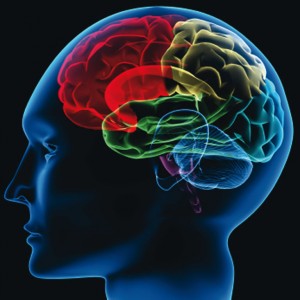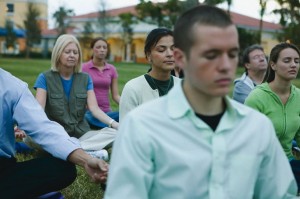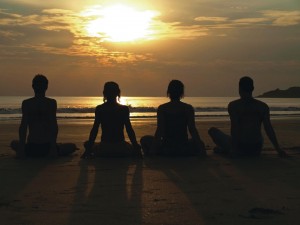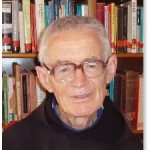The Need to Water the Roots
In the last article I pointed out that as a basis for prayer and the life of union with God we need in the first place to be fully human. Part of being fully human is that we find ways of cultivating the spirit and the deep-self. In this article I wish to demonstrate more fully the need to activate our hidden potential. It is very important to demonstrate conclusively how vital for spirituality is the development of the spirit and the heart. 
In the West most of us tend to be over-developed intellectually and under developed spiritually. The Greek Fathers taught that the purpose of human existence was that the Holy Spirit would rule our spirit, that our spirit would rule our soul or conscious self, and that our soul would rule our bodies. Unfortunately this goal cannot be realised if we stifle the Spirit of God (1 Thess. 5, 19) by not properly developing our own spirits.
Over emphasis on intellectual formation and excessive conscious activity serves to produce unbalanced human beings. At worst they become mentally ill because they haven’t integrated the development of the deep-self with the development of the conscious mind. At another level people, who are very objective in dealing with others, may have little compassion for and communion with people. The head is highly developed; the heart is unformed. Because the Buddhists by meditation cultivate the deep-self and spirit they are committed to compassion, not only for humans, but for all creation.
There are two kinds of meditation. There is the active use of all our faculties, which we practice in managing the affairs of daily life. This involves active meditation. But there is also passive meditation in which we do not use all our faculties but immerse ourselves in deep silence. In this sense also we can speak of two kinds of prayer, active and passive.
If we give ourselves excessively to conscious fervent prayers we can get mentally tired. Our brains and our nervous systems can only cope with a certain amount of fervour. Active prayer or meditation must be abandoned when we experience mental fatigue.
 However, if we switch to passive prayer, to practising the meditation of Main or Keating, we soon relax into silence and the strain disappears. A different part of the brain is now operating. ‘A change is as good as a rest’. This seems to indicate the need to alternate active and passive contemplation in one’s life of prayer. The passive contemplation waters the roots of our being and builds us up in spirit, mind and body.
However, if we switch to passive prayer, to practising the meditation of Main or Keating, we soon relax into silence and the strain disappears. A different part of the brain is now operating. ‘A change is as good as a rest’. This seems to indicate the need to alternate active and passive contemplation in one’s life of prayer. The passive contemplation waters the roots of our being and builds us up in spirit, mind and body.
In the U.S.A, Japan and elsewhere many scientific tests have been done which prove conclusively that meditation is therapeutic for body, mind and spirit. By ‘meditation’ here I mean techniques that lead us into deep inner silence. Various forms of meditation have been practised for over 2,000 years in Asia. This in itself is a strong indication of their value.
In the wake of Vatican II some Christians have embraced some of the Asian techniques so as to actualise more fully their human potential and put it at the service of Christ. Foremost in this field have been John Main and Thomas Keating, whom I have mentioned in other articles. Without surrendering one iota of the Gospel they have developed very successful forms of passive prayer that actualise the human unconscious and open it up to the Spirit of God. In my view they have integrated very successfully the essential wisdom of the East with Christian theory and practise. 
John of the Cross, Francis de Sales and others insist often that we must sometimes sit passively before the Lord and allow him to act. But neither saint has given us a technique for doing this. It is very hard to be still if one has no technique to lead one into stillness. Main and Keating, inspired by Asian practises, offer us techniques, which enable us, without too much difficulty, to enter into deep silence. They help us to be still and let God act. This deep inner silence, in a mysterious way, that we do not fully understand, helps to build us up at every level of our personality. This silence is good for mental health in a culture that bombards its members non-stop with conscious sensations. Psychiatrists often recommend meditation to their clients as a remedy for mental illness. Even when there is no serious mental illness meditation will integrate human beings within themselves.
The medical profession tells us that up to 60% of illness is psychosomatic. If this is true it logically follows that the cure of this illness is also psychosomatic. Scientific studies have shown that meditators get fewer heart attacks and less cancer than non-meditators. Meditation can often remedy depression and reduce the effects of stress. Studies have also shown that the active mind produces alpha brain waves and is associated with left brain activity. Deep inner silence produces theta brain waves and is associated with right brain activity and with deep relaxation.
 Ordinary consciousness involves constant activity of the imagination, intellect and will. Consciousness is altered in the deep silence of meditation. We passively will in the silence to let the deep-self ‘unfold’ of itself or ‘actualise’ itself. We use these terms, ‘unfold’ and ‘actualise’ to describe the indescribable. Something is happening in the deep silence but it is very difficult to perceive it and describe it. We simply stay still and let God act. Active volition is one type of willing; passive volition is another.
Ordinary consciousness involves constant activity of the imagination, intellect and will. Consciousness is altered in the deep silence of meditation. We passively will in the silence to let the deep-self ‘unfold’ of itself or ‘actualise’ itself. We use these terms, ‘unfold’ and ‘actualise’ to describe the indescribable. Something is happening in the deep silence but it is very difficult to perceive it and describe it. We simply stay still and let God act. Active volition is one type of willing; passive volition is another.
Meditation is a mysterious experience. Nothing seems to be happening in the depths of silence. Yet the tree is known by its fruits. The fruits of meditation are fully integrated people. It adds a new positive dimension to our lives. It makes us more fully alive and such people are the glory of God (Irenaeus). This should be the fruit of Christian Meditation.
However, meditation of itself will not make saints of people. The magazine ‘Time’ estimates that there are ten million people practising meditation in the U.S.A. Doubtless it makes them more fully human. But the vast majority seem to practise it for the sake of better health of mind and body. Such meditation is helpful but a Christian needs to put it at the service of charity and prayer. It is a good secular exercise that needs to be baptised. John Main and Thomas Keating have done this for us and they deserve our gratitude.
To sum up, we need to be fully human so that grace can operate in us. We will smother the Spirit if we do not realise as fully as possible our human potential. Experience and innumerable scientific studies have established beyond reasonable doubt that meditation, understood as entry into deep inner silence, is a powerful help in making us more full human beings. Because it makes us more human it makes us into more suitable instruments on which the Spirit can work. It opens us up to the Spirit of God.

 Entries(RSS)
Entries(RSS)